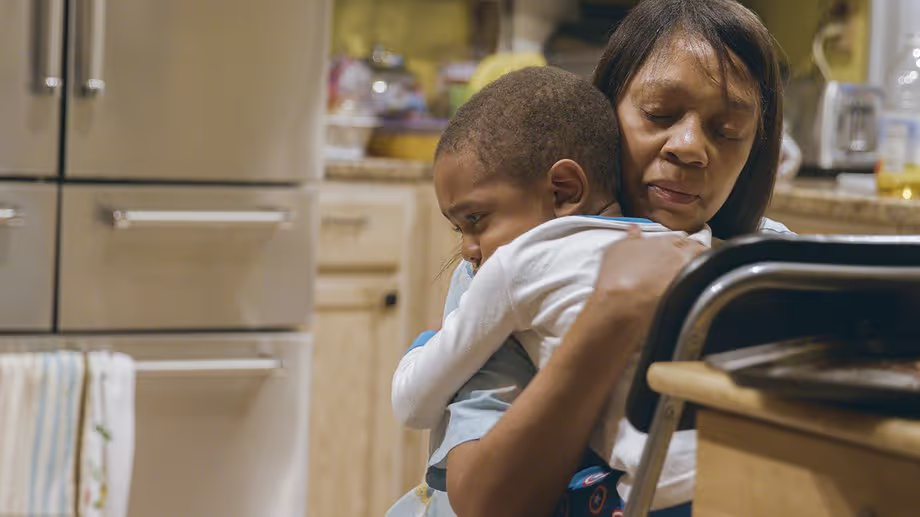Through The Night Discussion Guide Discussion Prompts
Discussion Prompts

PROMPT ONE: STARTING THE CONVERSATION
Immediately after the film, you may want to give people a few quiet moments to reflect on what they have seen. You could pose a general question (examples below) and give people some time to themselves to jot down or think about their answers before opening the discussion. Alternatively, you could ask participants to share their thoughts with a partner before starting a group discussion.
- What moments in the film resonated with you?
- What moments surprised you the most?
- How do you interpret the film’s title?
- If you could ask anyone in the film a question, whom would it be and what would you ask?
- If you were going to describe this film to someone, what would you say?
Choose one or more topics to discuss that may resonate with your participants:
MOTHERING & MOTHERHOOD
- What did you learn from each woman’s story and their roles as mothers?
- What resonated with you about their mothering journeys?
- What are some ways your own experiences with mothering or motherhood have shaped your lived experiences?
- Name some of the ways the film shows people including children engaged in mothering?
- How did seeing this make you feel? Do you think there may be anything like this happening in your own community? Why or why not?
- Did the film cause you to reflect on how you were mothered as a child?
- What are some methods you have adopted with your own children?
- What are you doing differently and why?
- What are the ways mothering as a verb can be brought into your activist spaces to make life better for caregivers?
CHILDCARE & CAREGIVERS
- Are you a childcare provider or caregiver, or do you have experiences working with childcare providers? If so, how did the film resonate with you? Did this film affect your relationship to thinking of the labor and necessity of childcare?
- Reflecting on your lived experiences, how did these roles of childcare providers or caregivers impact your life?
- What are some ways communities can support caregivers and childcare providers?
FRAMES OF PRECARITY: GENDER, RACE, AND CAPITALISM
- The film explores the intersection of precarity, gender inequality, capitalism and racism, what elements of this matrix stuck out to you most? Have your lived experiences intersected with these elements? If so, how?
- At what moments of the film were the ways that race, gender, and capitalism collaborate to create conditions for workers most salient? In what ways would you describe the conditions that these forces collectively create?
- Which communities does the rising cost of childcare impact most directly and in what ways does this film teach us about the experiences of those who are most impacted?
COMBATING STEREOTYPES THAT SHAPE BIPOC (BLACK INDIGENOUS PEOPLE OF COLOR) CAREGIVERS AND WOMEN, IN PARTICULAR, EXPERIENCES OF SELF-CARE
- Was there anything, or anyone, in the film that you see reflected in your city or neighborhood?
- If yes, in what ways and how did this film deepen your understanding of those in your community?
- If no, in what ways and how did this film deepen your understanding of yourself and your community in relation to others?
- What might care look like for the BIPOC caregiver or yourself? How does this film reflect care in radical and community-based ways?
- What are ways you think communities can support you in the work that you do?
DISCUSSION QUESTIONS FOR CHILDREN:
The film features the voices and experiences of children prominently. Consider holding screenings within the childcare facilities you operate or with the children in your lives. Here are some discussion questions for younger audiences:
- What was your favorite part of the movie and why?
- In the film, one of the kids talks about how his mother needs to get “Big
- Rest?” What are some of the things you’ve suggested your parents do when you notice they are cranky or just tired?
- What’s one small task you can complete this week that you can do to help your parents?
- Where are the places that you feel heard? Where are spaces that you feel Silenced?
- How does it make you feel when an adult listens to you?
- Marisol’s daughter says that she is afraid to grow up and have to work all the time? How did that make you feel? Do you think your caregiver likes their job? Do you feel like they work too much? If so, why do you think they do it? In what ways do you wish things were different for your parents?

